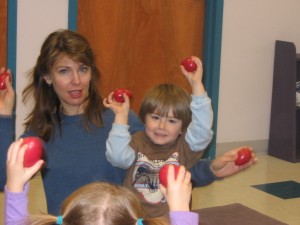Washington Post article so revealing “Background TV Distracts Kids from Play”
September 1, 2010 at 7:25 pm | Posted in Kindermusik, Washington Post | Leave a commentTags: ADD, ADHD, Attention Span, Child Development, Kindermusik, Serena Gordon, TV, Washington Post
Washington Post HealthDay Reporter Serena Gordon wrote this very interesting article about a recent study.
“Even if young children aren’t watching the TV, it may be distracting them from their play and depriving them of developing critical attention skills, a new study says.
When children aged 3 and younger played in a room with a television on that was tuned to adult programming, they played for about 5 percent less time than when there was no background TV. More importantly, when there was no background TV, the children’s play was more focused with longer play episodes, the study found.
“Background TV is a disruptive and distracting influence. Our evidence is that TV keeps the children from sustaining their attention at a time when developmentally, they’re beginning to organize their attention skills and sequencing behaviors,” said study senior author Daniel Anderson, a professor of psychology at the University of Massachusetts at Amherst.
“Parents think it [background TV] doesn’t matter because the programs aren’t directed at children, but just because a child isn’t paying active attention doesn’t mean it doesn’t have a disruptive effect,” he added….. (read more)
Conversing helps language development more than reading alone UCLA study says
September 9, 2009 at 3:00 am | Posted in Kindermusik | Leave a commentTags: Child Development, conversation, emergent literacy, kindermusic, Kindermusik, Language Acquisition, Language Development, Music, UCLA
Eurekalert reported today that a UCLA study finds that activities that get children 2 months to 48 months talking are most conducive to language acquisition.
Adult-child conversations have a more significant impact on language development than exposing children to language through one-on-one reading alone, according to a new study in the July issue of Pediatrics, the journal of the American Academy of Pediatrics.
“Pediatricians and others have encouraged parents to provide language input through reading, storytelling and simple narration of daily events,” explains study’s lead author, Dr. Frederick J. Zimmerman, associate professor in the Department of Health Services in the UCLA School of Public Health. “Although sound advice, this form of input may not place enough emphasis on children’s role in language-based exchanges and the importance of getting children to speak as much as possible.” (read more)
Activities like Kindermusik that encourage children to respond in class and to their parents are a great example of the give and take that this study is discussing. To acquire the knowledge a child must be actively involved in language and language type activities. What better avenue than a musical one that impacts even greater development and skill! “Loving your child is what it’s all about!”

Create a free website or blog at WordPress.com.
Entries and comments feeds.

